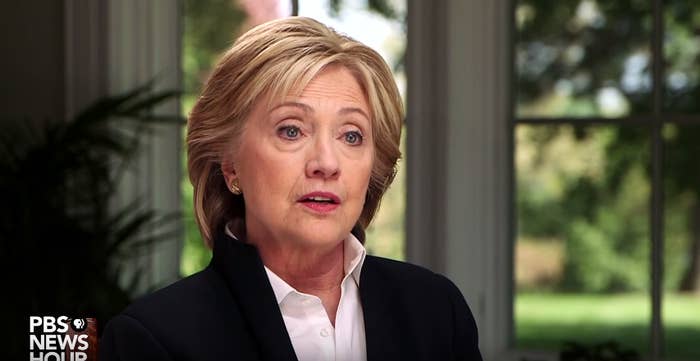
Citing concerns over currency manipulation and benefits for pharmaceutical companies, Hillary Clinton said on Wednesday she does not support the Trans-Pacific Partnership, the massive trade deal negotiated by the Obama administration with Japan and 10 other countries.
"What I know about it, as of today, I am not in favor of what I've learned about it," Clinton told PBS NewsHour anchor Judy Woodruff.
The Obama administration, along with Japan and 10 other countries, announced on Monday that they had reached an agreement on the Trans-Pacific Partnership, the largest regional trade deal in history.
Clinton, who in her role as secretary of state played a role in pushing for the TPP, said that from what she knows of the deal, she doesn't believe it meets the "high bar" she has set for an agreement.
"I have been trying to learn as much as I can about the agreement, but I'm worried," Clinton said. "I'm worried about currency manipulation not being part of the agreement. We've lost American jobs to the manipulations that countries particularly in Asia have engaged in. I'm worried that the pharmaceutical companies may have gotten more benefits and patients and consumers fewer. I think that there are still a lot of unanswered questions."
"So for the larger issues, and then what I know, and again I don't have the text, we don't yet have all the details," Clinton continued. "I don't believe it's going to meet the high bar I have set."
During a campaign stop on Tuesday in Davenport, Iowa, Clinton dodged a question about the trade deal, telling a reporter she still had research to complete before weighing in. "I'm going to be diving into that tonight," Clinton said. "I'm going to be talking to people about it. They're giving me all the information they can gather so that I can make a timely decision."
When the reporter noted that one of her top surrogates in Iowa, Tom Vilsack, supports the deal, Clinton said, "I certainly think that people have good opinions. I'm looking at all of them."
Earlier in the campaign, when asked about TPP, Clinton often said she wouldn't be commenting until seeing the final details of the trade deal.
As secretary of state, Clinton advocated for the TPP, calling the agreement a "gold standard" in "open free, transparent, fair trade — the kind of environment that has the rule of law and a level playing field."
In her memoir, which before Wednesday contained the most comprehensive recent statement from Clinton on TPP, she acknowledged that the deal wouldn't be "perfect." "No deal negotiated among a dozen countries ever will be," Clinton wrote, "but its higher standards, if implemented and enforced, should benefit American businesses and workers."
I'm continuing to learn about the details of the new Trans-Pacific Partnership, including looking hard at what's in there to crack down on currency manipulation, which kills American jobs, and to make sure we're not putting the interests of drug companies ahead of patients and consumers. But based on what I know so far, I can't support this agreement.As I have said many times, we need to be sure that new trade deals meet clear tests: They have to create good American jobs, raise wages, and advance our national security. The bar has to be set very high for two reasons. First, too often over the years we haven't gotten the balance right on trade. We've seen that even a strong deal can fall short on delivering the promised benefits. So I don't believe we can afford to keep giving new agreements the benefit of the doubt. The risks are too high that, despite our best efforts, they will end up doing more harm than good for hard-working American families whose paychecks have barely budged in years. Second, we can't look at this in a vacuum. Years of Republican obstruction at home have weakened U.S. competitiveness and made it harder for Americans who lose jobs and pay because of trade to get back on their feet. Republicans have blocked the investments that we need and that President Obama has proposed in infrastructure, education, clean energy, and innovation. They've refused to raise the minimum wage or defend workers' rights or adequately fund job training. As a result, America is less competitive than we should be. Workers have fewer protections, the potential positive effects of trade are diminished, and the negative effects are exacerbated. We're going into this with one arm tied behind our backs. I still believe in the goal of a strong and fair trade agreement in the Pacific as part of a broader strategy both at home and abroad, just as I did when I was Secretary of State. I appreciate the hard work that President Obama and his team put into this process and recognize the strides they made. But the bar here is very high and, based on what I have seen, I don't believe this agreement has met it.


